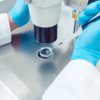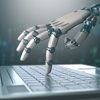Fritextsökning
Artiklar per år
Innehållstyper
-

Major advances in IVF labs in the last few decades
Since the introduction of in vitro fertilisation several decades ago, many developments have been made in the field, and the main part of that development has taken place in the lab.
-

Bör vi vara oroliga att AI tar över våra jobb?
Ingen kan ha undgått att det pratas om AI, artificiell intelligens, överallt. Men bör vi vara oroliga för våra jobb när AI gör entré?
-

Genomic Medicine Sweden inleder samarbete med Microsoft
Genomic Medicine Sweden påbörjar nu ett samarbete med Microsoft med syfte att hantera och öka förståelsen av den data som genereras inom precisionsmedicin.
-

Nästa generation AI kan bli OI
I höstas presenterades hur mänskliga hjärnceller i en odlingsskål lärt sig att spela Dishbrain, en variant av tv-spelet Pong. Nu tas nästa steg.
-

Blixtsnabb utveckling inom blodanalys – "Det är Sverige som leder racet"
Tusentals analytiska tester – med hjälp av en enda droppe blod. Det som avslöjades som en bluff för bara några år sedan är nu verklighet, enligt KTH-professorn och serieentreprenören Mathias Uhlén. "Utvecklingen på området går svindlande fort nu, och det är Sverige som leder racet", säger han till Life Science Sweden.
-

”AI som både imponerar och skrämmer”
"Tidigare har jag sällan varit särskilt imponerad över något som varit AI-producerat. Men det här är något helt annat", skriver Samuel Lagercrantz i en ledare om Chat GPT och om AI i sjukvården.
-

Editorial: ”AI that both impresses and frightens”
”In the past, I've rarely been particularly impressed by something that was produced by AI. But this is something completely different”, Samuel Lagercrantz writes in an editorial.
-

A surprising discovery about the immune system in cases of cancer
Professor Göran Jönsson is trying to understand why some patients benefit from immunotherapies while others don’t. A couple of years ago, he made a surprising discovery about the function of the immune system.
-

Rapid development in blood analysis – “Sweden is leading the race”
Thousands of analytical tests using just one single drop of blood. What was revealed as a hoax just a few years ago is now a reality, according to KTH professor and serial entrepreneur Mathias Uhlén.
-

AI hjälper till att kartlägga biologiska processer
Forskare vid Göteborgs universitet har med hjälp av AI i detalj kartlagt på vilket sätt celler och partiklar rör sig i levande materia. Studien presenteras i det senaste numret av Nature Machine Intelligence.
-

AI baserad på språkalgoritm skapade nya fungerande proteiner
Inte ens proteiner går säkra för språkrobotarna. I det senaste numret av Nature Biotechnology presenterades språkmodellen Progen som, enligt forskarna bakom studien, lärt sig semantiken och grammatiken i proteinernas språk.
-

Individual DNA passport could result in fewer drug side effects
You may be required to show a DNA passport when you pick up medicines at the pharmacy in the future. According to a new study, patients might suffer 30% fewer side effects if the drug treatment is adapted to their genes.
-

The government proposes fines for pharmaceutical companies that fail to notify drug shortages in time
According to a compilation from the Swedish Medicines Agency, the number of residually notified medicines increased by 54 % in Sweden last year compared to the previous year. In a bill presented by the government a number of proposals are put forward to counteract the problem.
-

The new Astra Zeneca CEO: “An incredibly exciting phase”
Almost 27 years have passed since Per Alfredsson from Södertälje stepped into Astra Zeneca as a newly hired engineer. After countless different roles, including heading the production of the company’s Covid vaccine, he is now advancing to the absolute top.
-

Sweden is organising a large life science conference as part of the EU presidency
On 26-27 June, Sweden will host a European meeting on life science.
-

“Everyone is screaming for talent”
Attracting talent is one of the life science industry’s major future challenges, which was one of the conclusions of the panel discussion that ended the New Horizons in Biologics & Bioprocessing conference on 15 December.